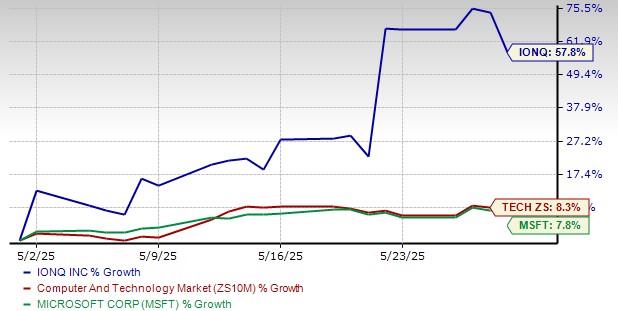IonQ vs. Microsoft: Quantum Cloud Investment Comparison
The emerging field of quantum computing has drawn significant attention from investors, with both IonQ and Microsoft making substantial moves in this space. IonQ, a pure-play quantum computing pioneer, focuses on developing cutting-edge quantum computers and networks. Microsoft, a tech giant, is integrating quantum technology into its Azure cloud platform. Let’s examine the fundamentals of both stocks to determine which is the better investment today.
The Case for IonQ Stock
IonQ has established itself as a leader in trapped-ion quantum computing, achieving significant technical milestones. The company secured its first commercial sale in Q1 2025, a $22 million deal with EPB, a Tennessee utility, to deploy its Forte Enterprise quantum computer and quantum network. This marked the debut of both quantum computing and networking in a real-world application, solidifying IonQ’s technological edge.

IonQ is aggressively expanding its reach through strategic partnerships and acquisitions. It has formed new partnerships in Asia and acquired controlling interests in quantum networking players like ID Quantique and Qubitekk. These moves expand IonQ’s total addressable market into areas like quantum-safe networking and secure satellite communications.
For 2025, IonQ forecasts revenue between $75 million and $95 million, representing roughly 97% growth at the midpoint. Despite its promise, IonQ faces challenges, including substantial unprofitability as it invests heavily in R&D and talent. The quantum computing sector is highly competitive, with major tech companies and emerging players vying for a stake.
The Case for Microsoft Stock
Microsoft is a tech giant with a dominant position in enterprise software and cloud computing. Its Azure cloud platform is pivotal to its quantum strategy, providing access to various quantum hardware and software tools through Azure Quantum. Microsoft unveiled its Majorana 1 quantum processing chip in early 2025, a breakthrough in topological qubit research.
Microsoft’s quantum strategy combines internal innovation with strategic partnerships. With $80 billion in cash reserves, Microsoft has the financial strength to continue investing in quantum initiatives without impacting its core business. Azure Quantum Elements is being rolled out for industries like chemistry and drug discovery.
While Microsoft’s quantum ambitions are exciting, they currently represent a small fraction of its overall business, limiting the immediate impact on its financials. The company faces challenges from competitors like IBM, Google, and Amazon in the quantum field.
Stock Performance and Valuation
IonQ’s stock has surged 57.8% over the past month, despite a modest 3.4% year-to-date gain. Microsoft has seen an 8.8% year-to-date increase and a 7.8% rise over the past month. IonQ’s forward 12-month price-to-sales ratio stands at 91.76, well above the sector average. Microsoft trades at about 10.99X, far below IonQ but above the sector.
Earnings Estimates and Growth Rate
IonQ’s Zacks Consensus Estimate for 2025 loss per share has narrowed, indicating analysts’ optimism. The estimated revenue implies year-over-year growth of 97.3%. Microsoft’s earnings per share estimate has increased, with consensus marks indicating 13.7% and 13% growth in revenues and EPS, respectively.
Conclusion
IonQ and Microsoft represent distinct plays in the quantum cloud space. IonQ is a high-risk, high-reward investment with impressive growth prospects, while Microsoft offers a more stable investment with a dominant presence in cloud and AI sectors. Given current market dynamics, IonQ’s aggressive growth trajectory gives it an edge for investors seeking higher risk and return potential, while Microsoft positions as a more conservative investment.


